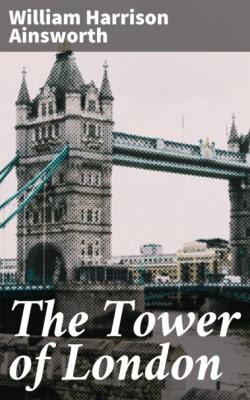The Tower of London. William Harrison Ainsworth
Читать онлайн.| Название | The Tower of London |
|---|---|
| Автор произведения | William Harrison Ainsworth |
| Жанр | Языкознание |
| Серия | |
| Издательство | Языкознание |
| Год выпуска | 0 |
| isbn | 4057664574879 |
XVI.—WHAT BEFEL CICELY IN THE SALT TOWER.
XVIII.—HOW COURTENAY ESCAPED FROM THE TOWER.
XX.—HOW EDWARD UNDERHILL WAS BURNT ON TOWER GREEN.
XXIV.—HOW XIT ESCAPED FROM THE CONSTABLE TOWER; AND HOW HE FOUND CICELY.
XXVII.—OF THE INSURRECTION OF SIR THOMAS WYAT.
XXVIII.—OF THE QUEEN’S SPEECH IN THE COUNCIL-CHAMBER; AND OF HER INTERVIEW WITH SIR THOMAS WYAT.
XXXI.—HOW JANE SURRENDERED HERSELF A PRISONER; AND HOW SHE BESOUGHT QUEEN MARY TO SPARE HER HUSBAND.
XXXII.—HOW THE PRINCESS ELIZABETH WAS BROUGHT A PRISONER TO THE TOWER.
XXXIV.—HOW THE PRINCESS ELIZABETH WAS CONFRONTED WITH SIR THOMAS WYAT IN THE TORTURE-CHAMBER.
XL.—OF THE VISION SEEN BY MAUGER AND SORROCOLD ON THE TOWER GREEN.
XLI.—OF THE UNION OF CHOLMONDELEY WITH ANGELA.
XLII.—THE EXECUTION OF LADY JANE GREY.
THUS ENDS THE CHRONICLE OF THE TOWER OF LONDON
London: Richard Bentley, New Burlington Street,
MDCCCXL
PREFACE.
It has been, for years, the cherished wish of the writer of the following pages, to make the Tower of London—the proudest monument of antiquity, considered with reference to its historical associations, which this country or any other possesses,—the groundwork of a Romance; and it was no slight satisfaction to him, that circumstances, at length, enabled him to carry into effect his favourite project, in conjunction with the inimitable Artist, whose designs accompany the work.
Desirous of exhibiting the Tower in its triple light of a palace, a prison, and a fortress, the Author has shaped his story with reference to that end; and he has also endeavoured to contrive such a series of incidents as should naturally introduce every relic of the old pile,—its towers, chapels, halls, chambers, gateways, arches, and drawbridges—so that no part of it should remain un-illustrated.
How far this design has been accomplished—what interest has been given to particular buildings—and what mouldering walls have been informed with life—is now to be determined:—unless, indeed, it may be considered determined by the numbers who have visited the different buildings, as they have been successively depicted by pen and pencil, during the periodical appearance of the work.
One important object the Author would fain hope his labours may achieve. This is the introduction of the public to some parts of the fortress at present closed to them. There seems no reason why admission
